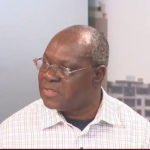Former Chief Justice Sophia Akuffo has called for the establishment of an independent appointment committee to oversee the selection of the Chief Justice, stressing the need for transparency and meritocracy in the process.
In an interview, she underscored the flaws in the current appointment system and the potential benefits of an independent commission.
Addressing concerns about partisanship in judicial appointments, Justice Akuffo criticised the perception that regime changes should influence the replacement of the Chief Justice.
“If I may be very blunt, that’s a very simplistic call. That’s not how it’s supposed to work,” she said. She stressed the need to focus on the Constitution and ensure that its provisions work effectively.
Justice Akuffo pointed out that the core issue lies in the process of appointing the Chief Justice.
“What is wrong in the Constitution is the process by which the judiciary is appointed, or, for that matter, the Chief Justice is appointed,” she explained.
The former Chief Justice proposed an independent appointment commission as a solution to enhance public trust and transparency.
“I think the public will feel more comfortable if there was some form of independent appointment commission,” she said, adding that such a body would be responsible for conducting a transparent nomination and selection process.
Justice Akuffo highlighted the importance of establishing clear qualifications and criteria for nominees, saying, “How people are to be nominated, how people are to be selected, what are the qualifications—these can all be done.”
She cited examples from other countries within the Commonwealth that have successfully adopted this method, stating that it has proven to be more merit-based.
Justice Akuffo referenced the United Kingdom’s Judicial Appointments Commission as a model to emulate.
“In the UK, there is a commission. It’s an endeavour to ensure that it’s more merit-based than largesse or a gift,” she noted, implying that such a system reduces the influence of political patronage.
She acknowledged potential challenges, such as determining who would appoint the commission members, but suggested that civil society organizations and other recognizable groups could play a role.
“So long as it is not at the direct whim of the presidency, people will feel more comfortable,” she stated.
Justice Akuffo’s remarks reflect her belief in a judiciary founded on competence and impartiality rather than political affiliations.
“The judiciary must be seen as independent, not just in its decisions but also in how its leaders are chosen,” she emphasized.
Her call aligns with broader recommendations made at the Commonwealth level for decades, advocating for reforms that strengthen judicial independence and public confidence in legal systems.
















